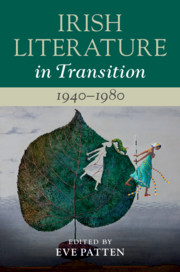Book contents
- Irish Literature in Transition, 1940–1980
- Irish Literature in Transition
- Irish Literature in Transition, 1940–1980
- Copyright page
- Contents
- Contributors
- Series Preface
- General Acknowledgements
- Introduction
- Part I After the War: Ideologies in Transition
- Part II Genres in Transition
- Chapter 5 Intermodernism and the Middlebrow in Irish Writing
- Chapter 6 Transitional Life-Writing: Frank O’Connor and the Autobiographical Tradition
- Chapter 7 ‘Somehow It Is Not the Same’: Irish Theatre and Transition
- Chapter 8 Samuel Beckett, Flann O’Brien and the Literature of Absurdity
- Part III Sex, Politics and Literary Protest
- Part IV Identities and Connections
- Part V Retrospective Frameworks: Criticism in Transition
- Index
Chapter 5 - Intermodernism and the Middlebrow in Irish Writing
from Part II - Genres in Transition
Published online by Cambridge University Press: 28 February 2020
- Irish Literature in Transition, 1940–1980
- Irish Literature in Transition
- Irish Literature in Transition, 1940–1980
- Copyright page
- Contents
- Contributors
- Series Preface
- General Acknowledgements
- Introduction
- Part I After the War: Ideologies in Transition
- Part II Genres in Transition
- Chapter 5 Intermodernism and the Middlebrow in Irish Writing
- Chapter 6 Transitional Life-Writing: Frank O’Connor and the Autobiographical Tradition
- Chapter 7 ‘Somehow It Is Not the Same’: Irish Theatre and Transition
- Chapter 8 Samuel Beckett, Flann O’Brien and the Literature of Absurdity
- Part III Sex, Politics and Literary Protest
- Part IV Identities and Connections
- Part V Retrospective Frameworks: Criticism in Transition
- Index
Summary
Recent critical developments in the field of intermodernism have opened new spaces for enquiry in mid-twentieth-century British and American writing, elevating the impact and status of several non-canonical texts typically considered as ‘middlebrow’. Intermodernism re-evaluates the political, even radical, potential of such material in the social environment of its time. This chapter explores the extent to which it offers a viable model for reconstructing the literary landscape of mid-twentieth-century Ireland, as a means of recuperating ‘minor’ novelists of the period, such as Dorothy Macardle, but also of reinterpreting the apparent creative hiatus in the 1940s and 50s, and recognising, in the place of modernist ‘aftermath’, a valuable literary circuitry founded largely on the strength of the ‘middlebrow’ novel. In rereading the period between 1940 and 1960 in particular, this chapter will discuss the definition of the nation in terms of its rural identity and explore the extent to which a supposedly conservative revivalist pastoral, in the work of writers including Walter Macken and Mary Lavin, in fact disguises the potential of a radical or resistant intermodernism.
Keywords
- Type
- Chapter
- Information
- Irish Literature in Transition, 1940–1980 , pp. 103 - 118Publisher: Cambridge University PressPrint publication year: 2020
- 12
- Cited by

